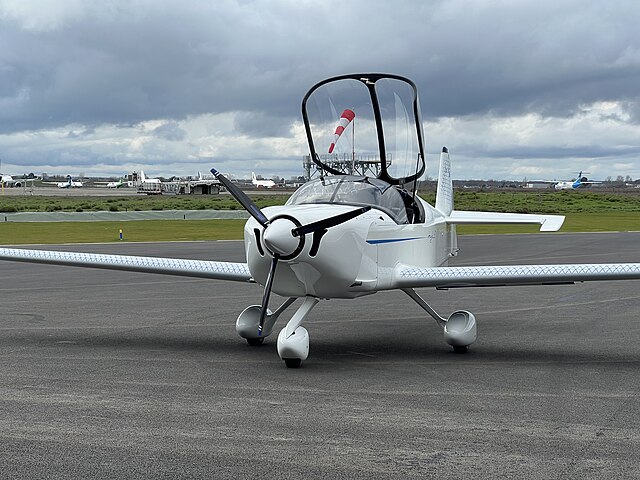
Are electric planes possible? Electric planes are possible, but not for long distances yet.
Electric cars are a very common site on the road these days, and you would think electric planes would be the next step, but electric planes are much harder to make than we think. The main problem is the range they have and the weight of the batteries.
There are several electric planes that exist and there are also several unmanned planes. In fact, the plane with the world record for the longest flying time for an unmanned vehicle is an electric plane. It is called the QinetiQ Zephyr and in 2010 it stayed aloft for 336 hours, which is just over two weeks. It is solar powered, has batteries to store the electricity, and only weighs 50 kg. It flew at 21,562 m to keep it out of the way of commercial planes and to make sure it was above the clouds to get as much sunlight as possible. It charged as much as possible during the day and used its batteries to keep going through the night. If you are trying to make a manned electric plane, it cannot be as light as this and it cannot fly as high as this, causing several problems.
One problem with looking at this question is that we are answering it using current technology. In the very near future, there may be batteries that can store far more energy and be much lighter than current batteries. However, with current electric batteries, and electric plane is a difficult concept. Generally, the heavier an electric vehicle battery is, the more energy it can store. Electric car batteries are made of many small battery packs that are connected together to get the required amount of power. Each battery contains lithium, which is the best material available for batteries at the moment. It charges very quickly, lasts much longer than other materials, is relatively light, and is relatively cheap. It obviously depends on the battery, but the average lithium battery has 250 Watt hours per kg. A Tesla Model Y has a 771 kg battery, which gives it 81 kilowatt hours, which is only 105 Watt hours per kg. Still, let’s go with the average of 250. That is 0.25 kwh. 1 kg of jet fuel produces 12 kwh of power, which means you would need 48 kg of battery for every 1 kg of jet fuel. A fully loaded 747 carries 121 tons of jet fuel, so you would need 5808 tons of batteries to fly a fully loaded 747 its full range. That is obviously not possible.
Jet engines are actually very efficient. They are more efficient than car engines. But they are enormous and they have to power a lot of weight over a long distance. Unless batteries can become much more energy efficient for their weight, it would not be possible for a passenger or a cargo plane to carry them. If the plane only flew with the batteries it can carry, they would not provide much range for it. A 747 has a range of 15,000 km. If it flew with the 121 tons of batteries it could carry, it would have a range of 312.5 km. I’m not sure anybody would want to go through the hassle of going to the airport and checking in just to fly 300 km on a 747.
There are four possibilities. The first is that batteries are only used on very small planes that don’t have to fly very far. They would probably be able to carry enough batteries for their short flight times. The second option is to wait for batteries to improve. They currently have an average of 250 wh/kg, but this is predicted to go up to 500 by 2030 and 750 by 2040 as technology improves. By 2050, it could be high enough that an electric plane becomes practical. The third possibility is hybrid planes. Anything that reduces the carbon footprint of a plane is not a bad thing and using some battery power on a plane can reduce its output by 5 to 10%. That doesn’t sound like a lot, but it is better than nothing. The fourth possibility is to give up on electric power and look at hydrogen power. Boeing has plans to release a hydrogen plane in 2025. There are many challenges, but it is lighter and will give a much greater range than electric power. And this is what I learned today.
Sources
https://en.wikipedia.org/wiki/Hydrogen-powered_aircraft
https://en.wikipedia.org/wiki/Electric_aircraft
https://www.airbus.com/en/innovation/energy-transition/hybrid-and-electric-flight
https://abcnews.go.com/Business/passenger-electric-planes-become-reality-decade/story?id=106223258
https://blog.evbox.com/ev-battery-weight
https://www.relionbattery.com/resource-center/technology/why-choose-lithium
https://en.wikipedia.org/wiki/Tesla_Model_Y
https://en.wikipedia.org/wiki/Boeing_747
Image By Zulu – Own work, CC BY 4.0,

Pingback: #159 How does a battery work
Pingback: Why do rechargeable batteries lose power as they age?
Pingback: #508 What is the range of a cell phone tower?
Pingback: #691 What causes a heat wave?
Pingback: #741 How fast could an electric car go?
Pingback: #755 What causes turbulence?
Pingback: #776 How does an e-cigarette work?